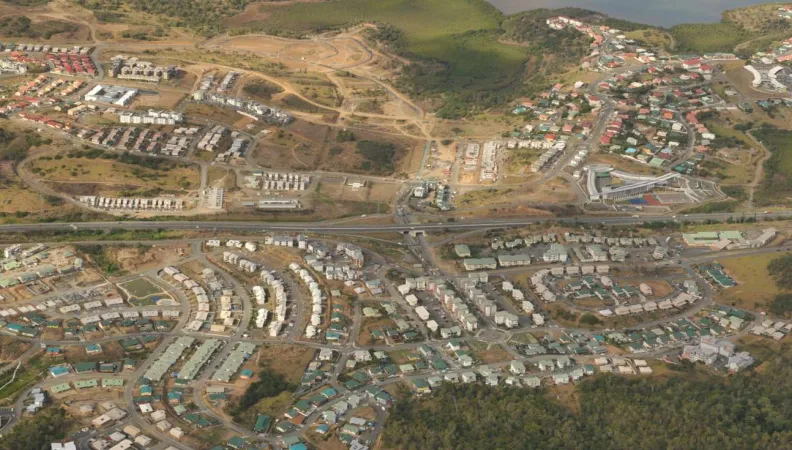Share the page
Large-scale development program to meet housing and equipment needs in Greater Nouméa
Project


-
Project start date
-
Status
Ongoing
-
Project end date
-
-
AFD financing amount
-
€ 85900000
-
Country and region
-
Location
-
Dumbea-sur-mer, Panda
-
Type of financing
-
Beneficiaries
-
New Caledonia Equipment Company (SECAL)
Two comprehensive development areas (ZAC) with complementary purposes – accommodate housing and business activities – have been created. The aim is to address the challenges of urbanization and development in Greater Nouméa. They should allow a harmonious development of the city, by promoting social and functional diversity through the provision of high-quality public facilities.
Context
With 180,000 inhabitants in 2014, Greater Nouméa is home to two-thirds of the population of New Caledonia. Faced with the population increase, the need for new housing is estimated at 2,000 housing units a year, with a marked shortage of social housing. The city’s development also increases pressure on land for companies. To meet these needs, while restoring coherence in the city faced with urban sprawl and avoiding a dormitory town phenomenon, in 2007, the South Province created two ZAC: Dumbéa-sur-mer and Panda. They are two inseparable components of a very large-scale development program (a total of 900 hectares) on the outskirts of Nouméa, making up the largest ZAC in France. The Dumbéa-sur-mer ZAC will accommodate housing, while the Panda ZAC will host industrial and craft activities.
Description
Dumbéa-sur-mer and Panda will eventually accommodate over 6,500 housing units (including 50% of social housing), 450 business units, and extensive public facilities. This project takes into account the needs of the future residents and companies by creating public facilities, such as the Médipôle (future territorial hospital center), the Néobus (the territory’s first bus rapid transit system), schools, a community center, playing areas, etc. Special attention is being paid to safeguarding the environment: signing of the “green project site” charter, dedicated spaces for soft modes of transport, sanitation…
In addition, in early 2016, the Panda ZAC became the first operation in overseas France to obtain the HEQ Development environmental certification. AFD has been supporting these two operations from the beginning, via long-term loans to the New Caledonia Equipment Company (SECAL), the concessionaire of the ZAC. In 2015, it allocated a new EUR 21m loan with a 9-year maturity to allow SECAL to finance the major expenditure programmed between 2015 and 2016 (creation of a new sector, a wastewater treatment plant, an exchanger…).
Impacts
This large-scale project is a driver for economic and social development and employment:
- By eventually housing 25,000 to 30,000 residents, either as tenants or owners. The creation of intermediate social housing and non-assisted housing will ensure that there is social diversity;
- By allowing companies to establish themselves in an environment conducive to their development;
- By promoting the preservation of the natural environment through the conservation and regeneration of the existing dry forest and the development of high-quality mangroves.


